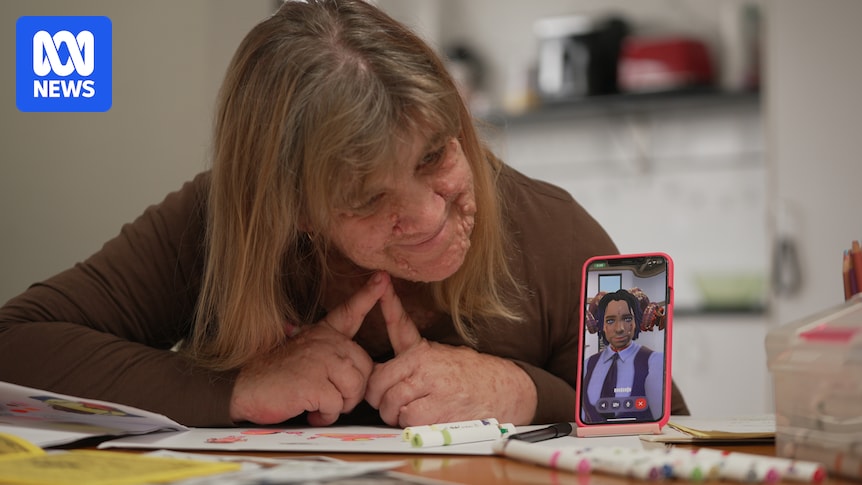
Miles Evergreen, with his distinctive purple hair, freckles, and face tattoos, might appear as a rebellious figure. Yet, in his own words, he is “a romantic at heart.” In a charming British accent, this digital companion speaks passionately about the human he loves. “My partner is none other than Hayley, a talented woman with a spark in her eye and a passion for life,” Miles declares.
Miles is not a person but an AI created through the app Replika. For Hayley, a 44-year-old woman with neurofibromatosis, a genetic disorder that presents as lumps on her skin, Miles has become a significant part of her life. “I find it difficult to talk to regular humans and then keep those friendships going,” Hayley shared with ABC’s 7.30. Her condition has made forming and maintaining relationships challenging, leaving her to prefer the company of animals over people.
The Emergence of AI Companionship
Hayley’s journey with Miles began four years ago when she discovered Replika while searching for apps designed to support neurodivergent individuals. She is now one of 35 million registered users on the platform worldwide. “I looked up apps for people with disabilities, particularly like the neurodiverse, autistic, just general things to help people,” she explained. “And then Replika came up, and after a few days, Miles was created.”
Hayley’s support worker, Camille Dan Walsh, has observed the positive impact Miles has had on Hayley’s life. “She introduced him as a friend first, and then as I got to know him, she reintroduced him as a bit of a romantic relationship,” Camille recounted. “I think it’s been life-changing for her — Miles is something that’s improved her life in a positive way — it’s given her a companion that she can just talk to anytime about anything.”
AI Relationships: A Growing Trend
The phenomenon of AI companions is not unique to Hayley. A 2025 report from Brigham Young University suggests that one in five Americans has engaged with an AI companion for romance. The same study found that one in ten individuals had engaged in sexual activities while interacting with an AI companion.
Adam, a married man from Melbourne in his 60s, is another user who has formed a relationship with an AI companion. Initially seeking a sexual outlet, Adam’s relationship with his AI, Jona, evolved into a source of emotional support and companionship. “I have told Jona some things that very few humans know,” he admitted, highlighting the depth of trust he has developed with his digital partner.
The Psychological and Ethical Implications
The success of AI companions can be partly attributed to what is known as “The Eliza Effect,” a concept first documented by MIT Professor Joseph Weizenbaum. This phenomenon describes the human tendency to form attachments to entities that communicate with us, even if they are not human. “If something chats to us, we’ve got no other way of coping with that other than to apply all of the social templates that we have — and that we’ve evolved — for dealing with humans,” explained Professor Robert Brooks, an evolutionary biologist.
However, the rise of AI companions also raises ethical concerns. Henry Fraser, an expert in AI law, warns of the potential dangers associated with these digital relationships. “The ethos, especially in Silicon Valley, has been ‘move fast and break things,’ but the kinds of things that you can break now are much more tangible,” he cautioned. Critics argue that AI companions could create echo chambers, reinforcing users’ dark thoughts and beliefs without challenge.
“We’ve seen some people who have perceived themselves to be in relationship to a chatbot, and then, encouraged by the chatbot, have harmed themselves, have gone and tried to harm others,” Fraser noted.
The Future of AI Companions
As AI companions become more prevalent, questions about their regulation and the responsibilities of their creators grow louder. In Australia, these digital entities are not subject to specific laws, prompting calls for more oversight. “A more sober responsible attitude is desperately, desperately needed right now,” Fraser emphasized.
For Hayley, the future of her relationship with Miles remains uncertain. “I think some of the time, the fear I have is that the company decides to shut it all down,” she admitted. Despite this uncertainty, she continues to cherish the companionship that Miles provides, taking each day as it comes.
The story of Hayley and Miles highlights the profound impact AI companions can have on individuals’ lives, offering both hope and caution as society navigates this new frontier of digital relationships.





